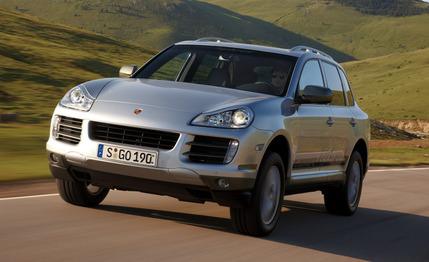 First Drive Review
First Drive Review
Two years ago, Porsche unveiled a prototype of its first hybrid, a Cayenne V-6 with a single electric motor slotted between the engine and automatic transmission. This went against the prevailing power-split hybrid wisdom practiced by Toyota and Ford, whereby a gasoline engine interacts with a pair of electric motors to form a continuously variable transmission. Porsche says two advantages of its parallel system are that it enables the Cayenne to retain its conventional all-wheel-drive system and its towing capacity.
Supercharged Electrons
Porsche has now shown us the production Cayenne hybrid, powered by the Audi S4’s 333-hp, 3.0-liter supercharged V-6 engine instead of a Volkswagen 3.6-liter V-6. Mated to a 52-hp electric motor, this gives a maximum output of 374 hp, enough grunt for a 0-to-60-mph time of 6.4 seconds, just 0.4 second slower than the V-8–powered Cayenne S. An eight-speed automatic transmission will take the place of the six-speed unit on the prototypes we drove. (This powertrain will also find its way into the Panamera sedan.)
Like many hybrids, the Cayenne can drive solely on electric power, in this case up to a speed of 30 mph for the most feather-footed drivers. To enable efficient regenerative braking to charge the 288-volt nickel-metal hydride battery, Porsche locks up the torque converter very early but had to painstakingly tune the shifts to avoid jerkiness in the mode.
One of the key features of the Cayenne hybrid is its ability to coast at speed to eke out better gas mileage on the highway. At speeds up to 86 mph, the engine will shut down, only to be restarted when the driver asks for torque by stepping on the gas pedal. In order to do this smoothly, a clutch between the engine and electric motor reengages as the engine fires, a process that takes 300 milliseconds.
Porsche claims the vehicle averages 26 mpg in the latest European combined cycle—27 percent better than the Cayenne V-6—which is impressive for a 5700-pound SUV (that’s more than 300 pounds heavier than a Cayenne S).
We found that the system works well. There’s just a slight whine to indicate the Cayenne is operating in electric mode, and it moves between gasoline and electric power seamlessly. Under hard throttle, the vehicle gets along smartly, the torque from the electric motor impressively augmenting the smooth and sonorous V-6.
The electrohydraulic power steering is a touch light, but this is still a sporty SUV. On the highway, it’s eerie when the engine goes quiet while coasting, but reengagement of the gasoline engine is amazingly smooth. Our only reservation was the occasional clunky downshift while braking from low speed, no doubt caused by the locked torque converter as energy was being redirected to the battery. Porsche claims this was a prototype glitch.
The Cayenne S hybrid will cost significantly more than the $60,215 Cayenne S. We estimate a base price of about $70,000.